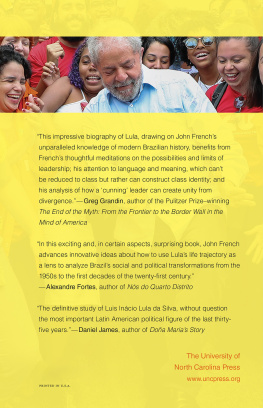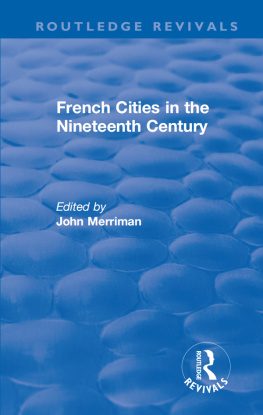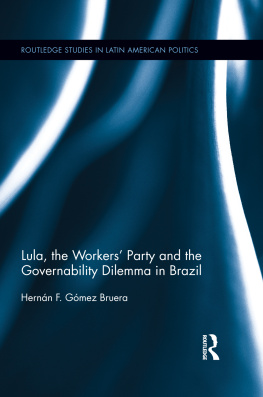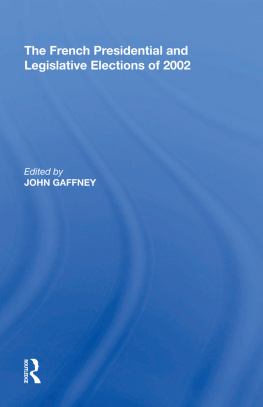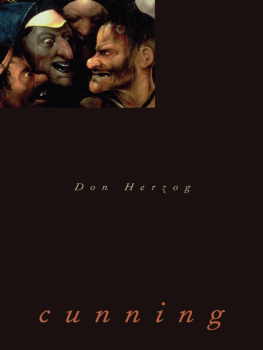French John D. - Lula and His Politics of Cunning
Here you can read online French John D. - Lula and His Politics of Cunning full text of the book (entire story) in english for free. Download pdf and epub, get meaning, cover and reviews about this ebook. year: 2020, publisher: University of North Carolina Press, genre: Politics. Description of the work, (preface) as well as reviews are available. Best literature library LitArk.com created for fans of good reading and offers a wide selection of genres:
Romance novel
Science fiction
Adventure
Detective
Science
History
Home and family
Prose
Art
Politics
Computer
Non-fiction
Religion
Business
Children
Humor
Choose a favorite category and find really read worthwhile books. Enjoy immersion in the world of imagination, feel the emotions of the characters or learn something new for yourself, make an fascinating discovery.
- Book:Lula and His Politics of Cunning
- Author:
- Publisher:University of North Carolina Press
- Genre:
- Year:2020
- Rating:3 / 5
- Favourites:Add to favourites
- Your mark:
- 60
- 1
- 2
- 3
- 4
- 5
Lula and His Politics of Cunning: summary, description and annotation
We offer to read an annotation, description, summary or preface (depends on what the author of the book "Lula and His Politics of Cunning" wrote himself). If you haven't found the necessary information about the book — write in the comments, we will try to find it.
Lula and His Politics of Cunning — read online for free the complete book (whole text) full work
Below is the text of the book, divided by pages. System saving the place of the last page read, allows you to conveniently read the book "Lula and His Politics of Cunning" online for free, without having to search again every time where you left off. Put a bookmark, and you can go to the page where you finished reading at any time.
Font size:
Interval:
Bookmark:
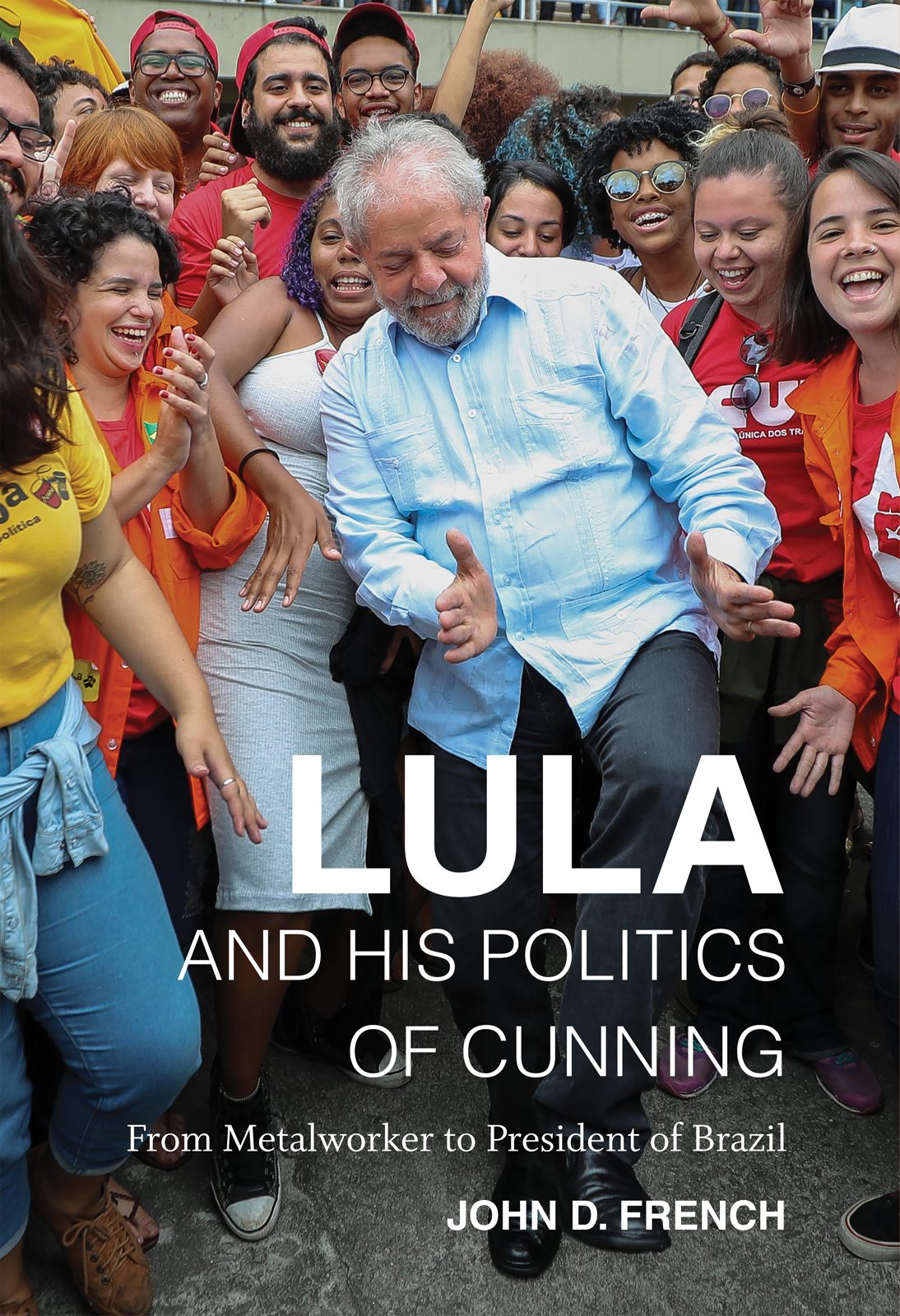
LULA
AND HIS POLITICS OF CUNNING
AND HIS POLITICS OF CUNNING
FROM METALWORKER TO PRESIDENT OF BRAZIL
JOHN D. FRENCH
The University of North Carolina Press CHAPEL HILL
PUBLICATION OF THIS BOOK WAS ASSISTED IN PART BY FUNDS FROM THE TRINITY COLLEGE OF ARTS AND SCIENCES AT DUKE UNIVERSITY.
2020 The University of North Carolina Press
All rights reserved
Designed by Rebecca Evans and set in Arno and Seria Sans by Tseng Information Systems, Inc.
Manufactured in the United States of America
The University of North Carolina Press has been a member of the Green Press Initiative since 2003.
Jacket illustration: Luis Incio Lula da Silva dancing with students at Instituto Multidisciplinar, Universidade Federal Rural do Rio de Janeiro, December 2017. Photograph by Ricardo Stuckert; Ricardo Stuckert and used by permission.
Library of Congress Cataloging-in-Publication Data
Names: French, John D., author.
Title: Lula and his politics of cunning : from metalworker to president of Brazil / John D. French.
Description: Chapel Hill : The University of North Carolina Press, 2020. | Includes bibliographical references and index.
Identifiers: LCCN 2020013710 | ISBN 9781469655765 (cloth : alk. paper) | ISBN 9781469655772 (ebook)
Subjects: LCSH: Lula, 1945 | PresidentsBrazilBiography. | PoliticiansBrazilBiography. | Labor leadersBrazilBiography. | BrazilPolitics and government19852002. | BrazilPolitics and government2003 | BrazilSocial conditions20th century. | BrazilSocial conditions21st century. | BrazilHistory20th century. | BrazilHistory21st century.
Classification: LCC F2538.5.L85 F74 2020 | DDC 981.06/5092 [B]dc23
LC record available at https://lccn.loc.gov/2020013710
Portions of .
DEDICATED TO
Marcos Andreotti (19101984)
Morgan James (19172006)
Philadelpho Braz (19262009)
David Montgomery (19272011)
Emlia Viotti da Costa (19282017)
Jan Hoffman French
Johnnetta Betsch Cole
LULA
AND HIS POLITICS OF CUNNING
In Lula and His Politics of Cunning, I embrace the biographical approach that I believe is essential to understanding how Luiz Incio Lula da Silvaa fourth-grade-educated man of the most humble originsrose to become the thirty-fifth Brazilian president in 2003. How did Lulaa man now known around the world by just his nicknameascend from his status as a poor rural migrant to So Paulo to become a metalworker, a union strike leader, and a radical leftist politician before finally attaining the presidency? A sui generis figure, Lula has been a star in Brazilian trade union and political life since his debut as a fiery strike leader over forty years ago. Whether loved, tolerated, or resented, Lula is familiar to all Brazilians, with his gruff voice, smiles, and boisterous good humor as well as his love of soccer metaphors and the hugs of an adoring populace. A veritable man of the people, Lula ended his second term in 2010 with an over 80 percent approval rating, and twice Brazilian voters elected his chosen Workers Party successor, Dilma Rousseff, to follow him as the country's leader. This stunning level of popularity in April 2009 led President Barack Obama to publicly hail Lula, when they first met, as the most popular politician on earth.
As the world's fifth-largest country, with over 200 million inhabitants, Brazil under Lula and Dilma experienced significant growth in GDP from 2005 through 2012, having been only briefly affected, in 2009, by the global financial crisis that wreaked havoc in the United States and Western Europe. Although Brazil is Latin America's most unequal country in terms of wealth distribution, the Lula-Dilma era pioneered innovative policies of inclusion and redistribution that produced a significant 10 percent drop in income inequality, with 40 million people escaping extreme poverty. As the eighth- or ninth-largest economy by GDP, the government's successes in expanding well-being and opportunity through mild but firm government intervention substantially enhanced access to social services, the consumer market, and education in the country, half nonwhite, that has the largest population of African descent outside the African continent.
By 2014, when Lulaby then a sixty-nine-year-old two-term president who was no longer in officehad helped his political party win its fourth consecutive presidential election, most Lula observers completely dismissed the man's first forty years of life as ancient history. The heights at which he had arrived seemed to distort the narrative arc of his personal and political story, allowing the process of historical contingency to fall away. I aim, in this book, to restore all that rich and neglected personal and political history, paying close attention to the first half of his life, which explains how Lula came so spectacularly to the notice of Brazil and the world in 1979 as the charismatic leader of massive strikes under a military dictatorship. It is these early days that offer the key to understanding how Lulathe most popular president in the history of Brazil and perhaps the worldlearned to act politically and came to shine both in nitty-gritty small-group interactions and as an effective communicator and trusted leader of hundreds of thousands and eventually tens of millions of Brazilians. His story will be shown to shed light on the worldview of the working poor, how radical social movements emerge, and how they can transform themselvesagainst the oddsinto a transformative electoral politics of consistency and achievement.
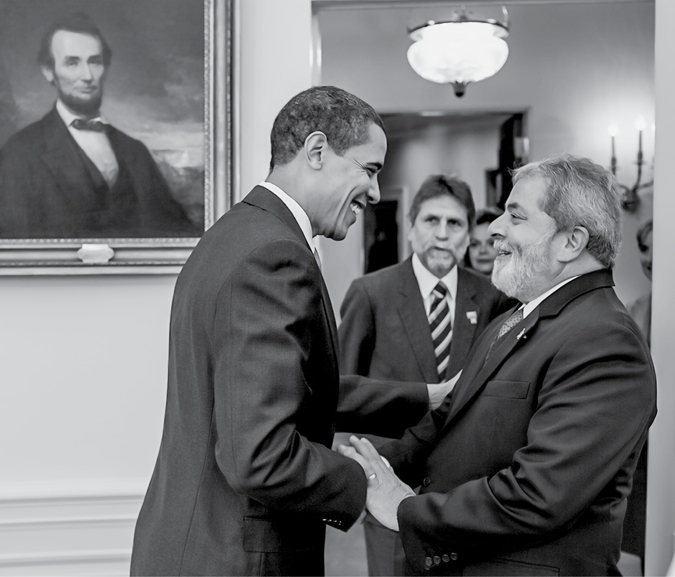
President Lula at the White House with President Barack Obama, 2009. (Photo by Pete Souza; courtesy Barack Obama Presidential Library)
In 2010, at the apex of his popularity, Lula's success seemed at times predestinedalthough destiny, as the Brazilian gacho poet Mrio Quintana has observed, is often chance attacked by a mania of grandeur. The inevitable, in other words, must be balanced by a frank recognition that Lula's extraordinary story is about a very lucky and gifted man. As it will show, Lula's understanding of the world and his message and stratagems draw from the cunning wisdom of the weak, but he deploys them on behalf of a transformative politics of cunning capable of changing a nation.
Lula's sui generis political trajectory is best approached by analyzing the city of So Paulo from midcentury through 1980, especially its trade union arena, where his leadership was forged. This biography is the first to investigate the decisive apprenticeships that allowed Lula to become a skilled machinist and a capable, even brilliant, trade union leader. What was the configuration of dispositions, understandings, and skills that characterized this young man, and where did they come from? How did he experience the world rapidly coming into being as So Paulo industrialized? For this city's industrial workers, what was the relationship between men and machine and between men and the employers to whom they owed labor and obedience? When and how did Lula acquire the judgment needed for successful political maneuvering? And after he had acquired this, from where flowed his unusual way with words, the confidence and facility with which he spoke and the boldness with which he acted?
In embracing the biographical, this book at the same time rejects an excessively individualistic narrative in which Lula's personal history displaces the history of his relationships. As Charles Payne has suggested for the US civil rights movement, excessive attention to a single individual, such as Martin Luther King Jr., not only denies the movement's bottom-up dynamics but also displaces the grassroots activists and mass following whose energies produced such a leader and gave him his stature and strength. This book would fail if, in fixating on the myth known as Lula, it overlooked the thousands of his friends, allies, and admirers, the tens of thousands of rank-and-file workers, and the tens of millions of his voters. Thus, the book foregrounds the social, political, and cultural processes through which Luiz Incio da Silva became the imagined Lula who is now the common property of all Brazilians.
Font size:
Interval:
Bookmark:
Similar books «Lula and His Politics of Cunning»
Look at similar books to Lula and His Politics of Cunning. We have selected literature similar in name and meaning in the hope of providing readers with more options to find new, interesting, not yet read works.
Discussion, reviews of the book Lula and His Politics of Cunning and just readers' own opinions. Leave your comments, write what you think about the work, its meaning or the main characters. Specify what exactly you liked and what you didn't like, and why you think so.

